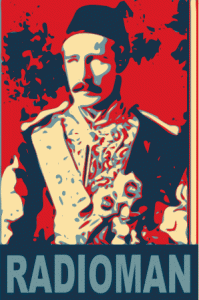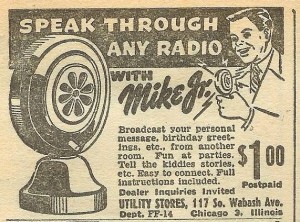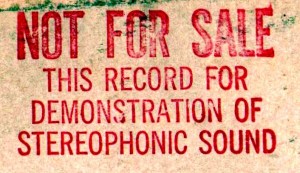I’m awed by all the radio enthusiasts, collectors, historians, and scholars out there; so I’m going to try to feature some of my favorites on Radio Survivor in a new feature called Radio Obsessives.
I didn’t realize it at the time, but my interview with Garrett Wollman about his fascination with radio towers is what prompted me to begin this quest to profile radio obsessives; simply because I love talking to other radio fans about radio.
“Jose Fritz” lives for radio and regularly blogs about radio factoids from the olden days on his blog Arcane Radio Trivia. In many ways I’ve found a kindred spirit in radio reportage, as Jose is also a fan of non-commercial radio and continues to remain optimistic about the future of college radio.
Interestingly, he’s opted on his blog to focus entirely on the past, avoiding “topical” stories for the most part. Consistently writing an impressive 5 posts a week, he’s covered everything from the long-forgotten radio show “The Fleischmann’s Yeast Hour,” to WXPN’s scandalous student radio past, to James Brown’s career as a radio station mogul, to little-known radio pioneers like Reverend Jozef Murgas.
I had an email chat with Jose Fritz to learn more about his radio obsession and to attempt to peel back some of the layers of his secret identity. I can tell you that he’s an engineer by day, is a blogger by night, has a music and radio past, and writes a fun and educational blog. On to the interview:
Jennifer Waits: When did you start Arcane Radio Trivia and what prompted you to begin writing the blog?
Jose Fritz: I began Friday, May 13th 2005. I decided one day maybe a few weeks prior that I needed a structure that would compel me to write more regularly. I gave myself a set of strict rules and started that Friday. It’s been 5 posts a week since then for 220 weeks; that’s 1047 posts not counting today. I keep thinking I should edit and compile them into a book.
I though it would make my other writing more productive. I was wrong. I did write more, but I wrote more about radio, instead of becoming a writing exercise it became a consuming hobby. I still manage to get the rest of my writing done, but I often end up posting after midnight.
Jennifer: Why are you obsessed with non-commercial radio?
Jose: Because commercial radio is homogeneous, and worse yet, boring. Non-commercial stations are more free, more varied, less structured and much more regional and local.
Even when a college station is bad, it tends to be exceptionally bad, strikingly bad, even entertainingly bad. I’ll choose entertainingly bad over inoffensively boring every time.
Commercial radio has been in a 30-year death spiral. When it’s all said and done they’ll have squeezed out every drop of what made them interesting.
Jennifer: Have you worked in radio before? Where?
Jose: It’s not just radio. It’s music too. I’ve booked shows. I’ve been in bands. I have been a music critic at newspapers, zines and webzines. I’ve worked at record labels, promotions companies and three radio stations. I really would like to volunteer at a local community station but it’s hard to find the time these days.
Jennifer: What do you love about radio?
Jose: That’s kind of a broad question. I really like being turned on to a band I’ve never heard of, a format that nobody ever tried before. I like old radio dramas. I also am fascinated by radio history as is evident from the continued existence of Arcane Radio Trivia.
Jennifer: What kind of radio do you listen to? (music/talk/college/etc.) Any favorite stations?
Jose: I like eccentric programming. As I travel the country I make note. I’ll listen to a screamin’ and hollerin’ preacher on the AM radio at night in New Orleans, I’ll listen to a Polka station in Chicago, A doo-wop show in Quincy, MA, a indie rock show, a great interview…
So let’s name names I think the Minister on WWOZ has spectacular taste as a jazz-man. I think that Jonathon Solomon on WPRB is constantly good with his playlist of indie rock. Joe Belock on WFMU has a Phd in garage rock. There are a plethora of good shows on NPR including This American Life, Fresh Air, American Routes, etc. WRAS, WSOU, KEXP, KCMP…all very reputable solid stations but low power, small market college stations like WHUS, KAOS, KXUA and others are also truly great.
Jennifer: You seem particularly interested in radio’s history. Why is radio history so compelling to you?
Jose: There are a couple reasons. History is easier for me to write about than current events. By definition there is more in the past than in the present. I also wanted to avoid being topical. I don’t want to focus on opinion pieces. I cover current events when I find them to be either A. directly tied to historical events. or B. so crucial I think people need to know.
Jennifer: What are your thoughts about the future of radio?
Jose: I think college radio despite some setbacks will persevere. I think they will weather things largely unchanged. Young people and hobbyists are great at adapting to change and adopting new technology.
Sadly commercial radio will continue to target that lowest common denominator in each demo and age bracket. The larger radio groups will cut costs, syndicate, simulcast, voice-track and automate every last drop of life out of the media platform.
My car stereo has a USB port. I don’t need to listen to the radio if I don’t want to. They often make me not want to.
Jennifer: How do you track down all the tidbits for your blog? Are you a collector of radio memorabilia?
Jose: Every time I read about something post-worthy, I start a draft. The backlog is several hundred unfinished posts deep now. I keep a set of radio reference books on my desk, I take notes, and I listen. When a “new” post goes up it might actually have been started 4 years ago. I add to them as I find out more information.
I don’t collect radio memorabilia so much, though I have a few items mics, and acetates and an absurdly large record collection.
Jennifer: What’s your day job?
Jose: I work for a radio monitoring company. I am the head field engineer traveling the country continually keeping the services up, the antennas secure and the contracts valid.
Jennifer: Is Jose Fritz your real name?
Jose: Nope. Different arenas of my writing get their own pseudonyms.
Jennifer: Anything else?
Jose: I keep thinking I can’t do this forever, but then can’t think of a good reason or time to stop.
Thanks so much to Jose Fritz for the interview and also for all of his work documenting radio’s past. In the coming weeks I’ll be featuring more Radio Obsessives.






